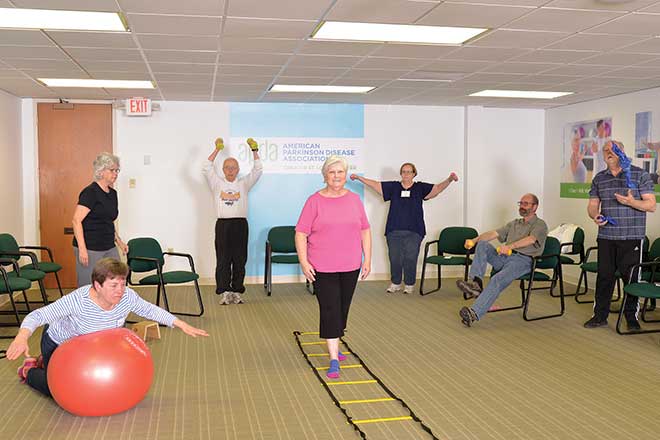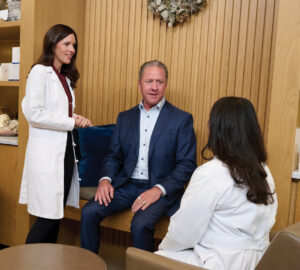Parkinson Disease, a neurological disorder caused by a lack of the chemical dopamine in the brain, now affects 1.5 million people in the United States. A new diagnosis is made every 9 minutes. A progressive disease, it eventually ravages a patient’s ability to perform even the simplest daily tasks. Increased longevity may account for the rise in diagnoses, but according to Debbie Guyer, executive director of the Greater St. Louis Chapter of the American Parkinson Disease Association (APDA), research done over the past few years has shown that simple exercise (tai chi, yoga, swimming) may slow the disease’s progression.
April is Parkinson’s Awareness Month, and the local chapter—one of the largest in the country—is launching some exciting new programs to mark it. One of those is a schedule of live-streamed exercise classes to be held at the APDA Community Resource Center in Chesterfield. “These are very important,” Guyer says. “Just as you wouldn’t miss taking a dose of medication, we don’t want people to miss a class. The people I see coming here to exercise don’t look a day worse [than when they started exercising]. It’s remarkable.”
Also new this month  is an adapted tango dance class at Convergence Dance and Body Center in Richmond Heights and a PEP Talk (Parkinson’s Education Program) on nutrition and its impact on the disease. “It’s always our goal at APDA to provide those who have been diagnosed with PD and their families the tools to continue to live life to the very fullest,” Guyer says. To that end, the association holds more than 40 support groups, 25 different exercise classes and multiple educational seminars. Guyer herself leads PD-101, a one-on-one session with families and individuals designed to answer questions, address concerns, and connect people newly diagnosed to valuable resources and services. “We hold these sessions five days a week. People say they never have had that much time devoted to them,” she notes.
is an adapted tango dance class at Convergence Dance and Body Center in Richmond Heights and a PEP Talk (Parkinson’s Education Program) on nutrition and its impact on the disease. “It’s always our goal at APDA to provide those who have been diagnosed with PD and their families the tools to continue to live life to the very fullest,” Guyer says. To that end, the association holds more than 40 support groups, 25 different exercise classes and multiple educational seminars. Guyer herself leads PD-101, a one-on-one session with families and individuals designed to answer questions, address concerns, and connect people newly diagnosed to valuable resources and services. “We hold these sessions five days a week. People say they never have had that much time devoted to them,” she notes.
In addition, there are small-group health and education courses, as well as quarterly seminars that bring larger groups together for discussions with healthcare professionals. The APDA also partners with local universities to provide handwriting, voice and speech courses, and enhanced exercise programming. The Center has a resource library and publishes a newsletter.
All programs are offered free of charge to help patients and their families enhance quality of life. None of this would be possible without funding, however, and on May 15, APDA hosts its biggest fundraiser, the 19th Annual APDA Golf Classic in Memory of Jack Buck, who himself had Parkinson’s, at Algonquin Golf Club. Honorary chair is John Mozeliak, senior VP and general manager of the St. Louis Cardinals; KMOX sports director Tom Ackerman is emcee. For those who don’t golf, Guyer notes there’s a dinner-only option available.
Meanwhile, plans are being finalized for the June 10 Optimism Walk taking place at Maryville University. This, Guyer says, is a wonderful opportunity for friends and family to visit with each other, enjoy activities (regardless of age), meet others with Parkinson’s, and learn more about the Parkinson community and APDA’s role in it. The honorary chair for this event is business innovation consultant and former CEO of Pulaski Bank, Bill Donius.
The APDA Golf Classic in memory of Jack Buck takes place May 15 at Algonquin Golf Club. The Optimism Walk is slated for June 10. For tickets, event and general Parkinson’s information, call 636.778.3377 or visit stlapda.org.
Cover design by Allie Bronsky | Cover photo by Colin Miller of Strauss Peyton Photography
Photo at top: Bill Barrett








